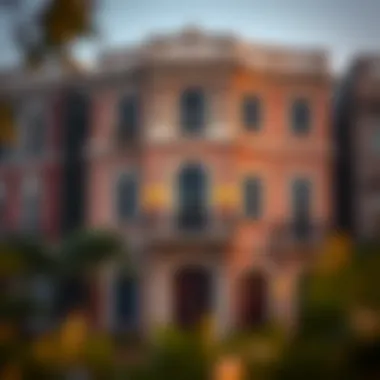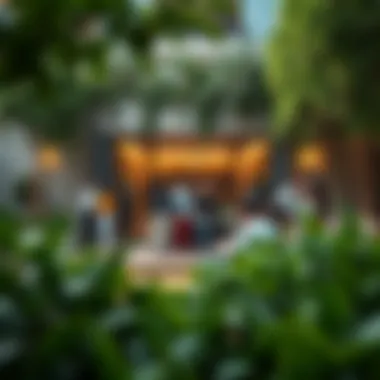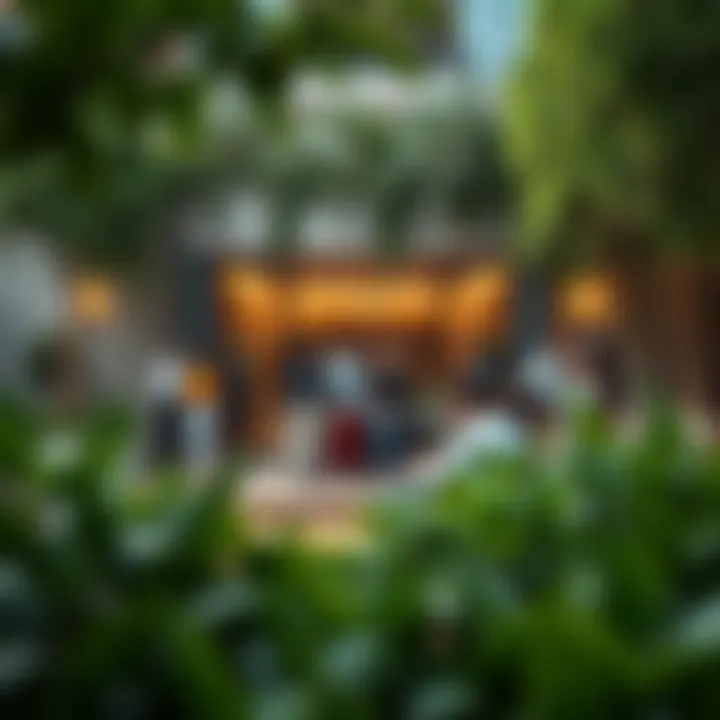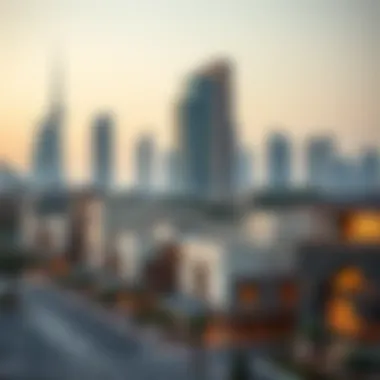Society Houses: Cultural Hubs of Downtown Dubai


Intro
In the heart of Downtown Dubai lies a collection of society houses that stand as a testament to the city’s rich tapestry of cultures and communities. These community-centric hubs provide more than just a physical space; they embody social connections and cultural exchange that enhance the vibrancy of urban life. As we navigate through their history and significance, we’ll uncover how society houses have woven themselves into the very fabric of the city, influencing both the social landscape and the architecture that dominates Downtown Dubai.
We will delve into current market trends that highlight the value these establishments hold within the prosperous real estate scene. Moreover, we'll take a glimpse into investment opportunities that are ripe for exploration, ensuring that potential investors and interested parties have a comprehensive overview of this often-overlooked aspect of Dubai's dynamic environment.
Understanding the intersection between societal function and market dynamics is key in appreciating the role these houses play in shaping not just the present but the future of Downtown Dubai.
Foreword to Society Houses
The concept of society houses is a fascinating aspect of urban living, particularly in dynamic locales like Downtown Dubai. In this bustling area, where the skyline is dotted with glistening skyscrapers, society houses serve as more than just architectural features—they foster a sense of community and cultural exchange. These houses offer spaces where diverse groups can convene, collaborate, and celebrate shared interests or backgrounds. By delving into the essence of society houses, we unveil their critical role in the urban fabric, addressing social, cultural, and economic dimensions.
Defining Society Houses
So what exactly are society houses? At their core, society houses act as communal spaces designed for gatherings, cultural activities, and social events. They can be likened to a melting pot, bringing together individuals from various walks of life to share experiences and ideas. These venues often host exhibitions, workshops, discussions, and even celebrations, acting as platforms for interaction and engagement.
Importantly, the term ‘society house’ emphasizes connection. It highlights the spirit of belonging, suggesting these spaces are not merely real estate but integral parts of the community. A society house could be a modern building with sleek lines, or it might carry traditional architectural elements, yet its purpose remains consistent: to unite people under a common roof for various activities ranging from arts to business networking.
Historical Context of Society Houses
The legacy of society houses can be traced back to various cultures around the globe, each adding layers of meaning and function over time. Historically, they were places where elite members of society would interact, share philosophies, and tackle pressing issues of their times. In the context of Dubai, the evolution of these houses intertwines with the city’s rapid development and transformation into a cosmopolitan hub.
Traditionally, in the UAE, such spaces were often informal gathering spots in local neighborhoods. They later evolved into more structured buildings, with their prominence growing alongside the nation’s modernization efforts in the late 20th and early 21st centuries. As Dubai blossomed into a global city, society houses now reflect contemporary ideals of inclusivity, openness, and progressiveness, while preserving cultural heritage.
In essence, the trajectory of society houses underscores their adaptability. They are continuously reshaped by societal needs and changes, acting as living entities that respond to the evolving urban landscape. As we proceed through this exploration, it becomes clear that society houses are not merely venues, but crucial components that shape community interactions and the overarching cultural narrative in Downtown Dubai.
Cultural Significance in Downtown
Society houses in Downtown Dubai are not just architectural marvels; they serve as vibrant cultural hubs that contribute significantly to the social fabric of the area. Their importance extends beyond mere existence, embodying a sense of identity and belonging for residents and visitors alike. These establishments play a crucial role in fostering connections among diverse populations, fostering a shared understanding of different cultures and traditions.
Role in Cultural Exchange
Art Exhibitions
Art exhibitions held in society houses often become focal points for cultural exchange, showcasing artistic talents from various backgrounds. These events provide a platform for local and international artists alike, allowing them to narrate their stories through visual mediums. A unique characteristic of these exhibitions is their ability to bring together different communities, thus encouraging dialogue and understanding.
The presence of an art exhibition in a society house not only attracts art enthusiasts but also serves as a bridge connecting various cultural narratives. It highlights local talent while integrating international influences, making art an accessible experience for all attendees. Particularly popular among residents is the trend of featuring up-and-coming artists whose works challenge conventional artistic boundaries. However, one may argue that the commercialization of art could overshadow genuine artistic expression, which is a potential pitfall that organizers must carefully navigate.
Cultural Festivals
Cultural festivals in society houses unleash the spirit of celebration and unity among residents. These events, often themed around specific cultural traditions, allow individuals to immerse themselves in unique experiences, from traditional music and dance performances to culinary showcases. One of the key characteristics of these festivals is their inclusive nature, drawing in people from all walks of life.
Incorporating elements from different cultures not only enriches the festival experience but also serves as an educational platform for attendees. This shared immersion cultivates mutual respect and appreciation among participants. Nonetheless, a challenge arises when balancing authenticity and commercial interests. As festivals grow in popularity, there’s a risk that the essence of the cultural heritage being celebrated could be diluted in favor of entertainment value, prompting organizers to strike a careful balance.
Promoting Local Heritage


Society houses play a pivotal role in promoting local heritage, serving as guardians of cultural traditions. They provide a space where historical narratives can be preserved and communicated through workshops, lectures, and exhibitions. By doing so, society houses ensure that younger generations remain connected to their roots.
These establishments often collaborate with local historians and cultural practitioners to present authentic narratives, which enhances awareness and appreciation for the region's rich heritage. Moreover, society houses contribute to this preservation by adapting to modern needs while remaining true to their original cultural significance. This adaptability is crucial as it allows them to appeal to a broader audience without losing sight of their mission to maintain cultural integrity.
Architectural Styles
When diving into the architecture of society houses in Dubai, one encounters a melange of styles that reflect the city's vibrant culture and history. The architectural styles not only define the visual appeal of these buildings but also serve to unearth the cultural stories they encapsulate. A well-thought-out architecture can provide an inviting atmosphere while promoting community interaction. Society houses present a unique opportunity to view how design transitions between the modern and traditional, striking a balance that serves both functionality and aesthetics in downtown Dubai.
Modern Designs
As the skyline of downtown Dubai evolves, modern designs prominently feature clean lines, open spaces, and a minimalistic approach, embodying the current trends in architectural understanding. These designs prioritize functionality and sustainability, allowing for bright, airy interiors that encourage social interactions. Larger glass windows provide an unobstructed view of the city, creating a seamless connection between the indoors and the urban landscape. This design choice not only enhances natural light but also fosters a sense of openness, vital for community activities.
Additionally, the use of modern materials like steel and composite aluminum showcases innovative building techniques. The structural strength combined with aesthetic elegance makes these houses appealing to investors and visitors alike, establishing them as hubs of social and commercial activities in the heart of the city.
Traditional Aesthetics
Contrasting the sharp angles and extensive glass of modern designs, the traditional aesthetics found in society houses harken back to Dubai's cultural roots. These structures often feature intricate detailing, traditional motifs, and natural materials that resonate with the city's rich heritage. The incorporation of arches, domes, and ornamental columns reflects the influence of Islamic architecture, which brings a sense of grandeur.
Influence of Islamic Architecture
Islamic architecture significantly shapes the traditional aesthetic of society houses. Its key characteristic is the delicate use of geometric patterns and calligraphy, which are not just decorative but also serve a purpose, often reflecting spiritual beliefs. These elements bring an air of sophistication while inviting patrons to engage with the cultural essence of the space.
A unique feature of Islamic architecture is the mashrabiya, a type of window lattice that allows for airflow and privacy. This element is particularly advantageous in Dubai's warm climate, creating a more comfortable environment within society houses. While potentially limiting some views, its cultural significance remains undisputed, allowing society houses to embody local traditions.
Sustainable Features
In recent years, there has been a growing emphasis on sustainability within both modern and traditional designs. Sustainable features often include energy-efficient lighting, water-saving fixtures, and green roofs that can reduce heat absorption while providing communal green spaces. This approach not only aligns with global trends toward environmental stewardship but also enhances the attractiveness of society houses as progressive community hubs.
Such key characteristics of sustainable designs resonate well with the heightened awareness around environmental issues today. Materials used are often sourced locally, representing a commitment to the region's ecological stability. However, one advantage to be noted is that utilizing sustainable features can sometimes lead to increased building costs upfront, which may be at odds with a developer's profit motive in the increasingly competitive market of downtown Dubai.
In summary, the architectural styles of society houses in downtown Dubai are a reflection of its rich past while catering to the demand for modern functionality and sustainability. The blend of modern designs with traditional aesthetics not only shapes the physical landscape but also encapsulates the cultural dialogues happening within these spaces.
Commercial Aspects
The commercial aspects of society houses in Downtown Dubai cannot be overstated. These establishments serve not just as cultural hubs but also play a pivotal role in the economic landscape of the area. They enhance the local commerce and act as a magnet, drawing in both residents and visitors alike. The success of society houses influences local retailers, service providers, and even tourism—creating a symbiotic relationship that fuels growth.
Economic Impact on Neighborhoods
Society houses significantly contribute to the economic vitality of their neighborhoods. By attracting visitors for various events, workshops, and exhibitions, they stimulate business for nearby shops and restaurants. Imagine a Saturday afternoon where a local art exhibition at a society house draws in hundreds of people; the coffee shop down the road likely sees an uptick in sales as visitors stop for refreshments. This ripple effect can revitalize an area, transforming it into a bustling community hub.
Moreover, the creation of jobs surrounding these houses is noteworthy. From administrative roles to service staff, society houses not only provide employment but also support local talent, thus integrating the community into their operations.
Society Houses as Business Hubs
Networking Events


Networking events at society houses serve a specific purpose and are tailored to foster connections among professionals from various industries. These gatherings often take place in a welcoming environment, allowing individuals to interact in a relaxed setting, which is a stark contrast to conventional conference rooms. The charm of these venues adds a unique touch, making them a popular choice for networking. The key characteristic of these events is their focus on personal interaction, as opposed to just handing out business cards.
Some unique features of networking events include workshops, panel discussions, and interactive sessions that encourage engagement among attendees. The benefits are clear: participants leave with valuable contacts, insights, and sometimes even partnerships. However, it’s essential for organizers to curate the guest list carefully to ensure that the right mix of participants is present, or else the tangibility of connections may fall flat.
Startups in Society Houses
Startups are increasingly finding a nurturing environment within society houses. These spaces offer more than just a place to work; they provide an ecosystem that supports innovation. The accessibility to resources, mentorship, and community involvement makes society houses an attractive option for fledgling enterprises. In fact, many startups gravitate towards these spaces due to the collaborative and inspiring atmosphere.
A distinctive advantage is the potential for visibility; being housed in a society house can boost a startup's profile exponentially. They often host pitch events and demo days, acting as a platform for entrepreneurs to showcase their ideas. However, balancing space usage among various startups can be a challenge, as the demand may exceed the available resources. Nonetheless, the benefits of being in such a vibrant environment often outweigh the drawbacks, allowing startups to thrive amid established networks.
Social Interactions and Community Building
In the bustling landscape of downtown Dubai, society houses emerge as key players in fostering social interactions and building vibrant communities. These establishments not only serve as social venues but also as catalysts for encouraging connections among individuals from diverse backgrounds. As hubs of engagement, they facilitate meaningful interactions that transcend mere acquaintance, leading to collaborations, friendships, and a genuine sense of belonging.
Fostering Community Engagement
Society houses play a vital role in nurturing community engagement by creating spaces that invite participation. They offer a platform for locals and expats alike to gather, share ideas, and celebrate cultural diversity. Events such as workshops, dialogue sessions, and cultural performances hosted at these venues inspire individuals to connect over shared interests and aspirations. Such engagement is instrumental in creating a cohesive community, where differences are celebrated rather than divided.
A strong community is built on the back of meaningful interactions; society houses provide the scaffold for these connections.
Furthermore, through various outreach initiatives, society houses also extend their impact beyond their walls. They partner with local organizations and charities to organize events that encourage volunteerism, environmental stewardship, and support for local businesses. Such initiatives not only strengthen community ties but also instill a sense of responsibility and collective purpose among residents.
Intergenerational Spaces
Activities for All Ages
The hallmark of society houses often lies in their ability to cater to a wide range of age groups. Activities for all ages are not just a marketing strategy but a genuine effort to engage families and youth, ensuring that every generation feels welcomed. Workshops that teach traditional crafts, cooking classes showcasing local cuisine, and art exhibits aimed at inspiring young artists are just a few examples of how society houses can attract a multigenerational audience.
These programs offer a unique advantage: they foster dialogue between older and younger individuals, promoting a shared understanding and appreciation of heritage while simultaneously embracing modernity. Often, intergenerational activities allow for storytelling, where older members share wisdom and experiences, enhancing the fabric of community ties within society houses.
Volunteer Initiatives
Volunteer initiatives are another specific aspect that stands out within the framework of society houses. Offices, community members, and various organizations often come together to launch programs focusing on social issues such as homelessness, education, and environmental sustainability. Volunteering not only benefits those in need but also enriches the volunteers' experience, allowing them to connect deeply with their community.
The unique feature of these initiatives is the creation of a robust network of active citizens. It aids in galvanizing support for crucial causes while creating a sense of ownership and engagement among participants. However, these programs also face challenges, such as lack of resources or volunteers. Nonetheless, even small-scale efforts yield vast benefits for the community fabric, reinforcing the importance of collective action.
Challenges Facing Society Houses
Society houses in downtown Dubai play a vital role in shaping the social and cultural fabric of the community. However, they are not without struggles. Recognizing the challenges these establishments face is crucial. It opens up a conversation about sustainability, identity, and development in a rapidly changing urban landscape. Understanding these pressures can also inform future strategies to ensure that society houses continue to thrive, contributing meaningfully to the city.
Urban Development Pressures
Urban development is a double-edged sword. While it brings progress and modernization, it also raises pressing issues for society houses. These places, built on the foundations of community and connection, often find themselves at odds with the rapid pace of construction and the influx of high-rise buildings.
- Limited Space: Society houses may struggle to secure adequate land and resources in a market favoring larger, more profitable developments. This can lead to downsizing or even closure, as these establishments typically require more space for events, exhibitions, and community activities.
- Rising Costs: Urban development often brings up property values, which translates to higher rent and operational costs for society houses. The financial strain can be overwhelming, particularly for those relying on community support and modest funding.


Moreover, the loss of historical buildings to new constructions alters the cityscape. It erodes the very essence of cultural exchange and community, which society houses aim to promote. Without a strategic approach to balance development and preservation, the unique character of society houses may be lost in the shadows of towering skyscrapers.
Maintaining Cultural Identity
Cultural identity is another significant challenge facing society houses. In a city as diverse as Dubai, where different cultures converge, preserving one’s identity while embracing globalization is a task fraught with complexity.
- Cultural Dilution: The influx of international influences can dilute local traditions, making it difficult for society houses to maintain authentic cultural programming. Craft fairs, local art showcases, and traditional music nights suffer when they compete for attention with global brands and trends.
- Community Alienation: As society houses adapt to changing demographics, they risk alienating long-time local patrons. If these venues become more focused on attracting tourists or expatriates, they may unintentionally sideline their core community base. This distancing can jeopardize the very interactions that society houses were created to foster.
Society houses must walk a tightrope—embracing modernity while remaining deeply anchored in their cultural roots. Balancing these contrasting needs is essential for their continued relevance.
In summary, the challenges facing society houses in downtown Dubai highlight the delicate nature of urban development and cultural preservation. Addressing these issues is key to ensuring that these establishments not only survive but flourish in the dynamic landscape of the city.
Future of Society Houses in Downtown Dubai
As we cast our eye towards the horizon, the future of society houses in downtown Dubai emerges as a crucial topic. These establishments are not just relics of the past; they are vibrant institutions poised to evolve in response to shifting urban dynamics, cultural trends, and the demands of a growing populace. Understanding this evolution is essential for investors, agents, buyers, and analysts who are navigating the complexities of Dubai's real estate landscape.
Emerging Trends
The concept of society houses is undergoing a notable transformation, reflecting broader trends that resonate throughout suburban and urban development across the globe. One key trend is the integration of technology into society houses. Enhanced digital applications are setting the stage for innovative ways of interaction and connection, catering to an increasingly tech-savvy population.
- Smart Features: Many society houses are adopting smart technology to manage resources more efficiently. Automated systems for lighting, climate control, and security enhance user experience and save on operational costs.
- Virtual Events: Following the COVID-19 pandemic, many houses have embraced hybrid models, hosting virtual and in-person events, allowing greater participation from both local and international audiences.
- Sustainable Practices: There's a growing emphasis on sustainability. Society houses are incorporating green technologies to minimize their ecological footprint, such as solar panels, rainwater harvesting systems, and eco-friendly materials in renovations.
Moreover, the push for inclusivity is gaining steam. Society houses are increasingly designed to welcome diverse communities, featuring facilities and programs that cater to marginalized groups. This trend will likely see an increase in intergenerational activities and events that promote cohesion among different cultural backgrounds.
Predictions for Development
Looking forward, it is reasonable to anticipate several developments that will shape the future of society houses in downtown Dubai. With urbanization on the rise, there will be a focus on the connectivity of these houses to public transport and other key city infrastructures. Locating society houses close to transportation hubs will enhance their accessibility, making them more appealing to a wider audience.
- Mixed-Use Spaces: We expect society houses to increasingly merge functions, serving as both community hubs and commercial venues. This blend of uses will likely attract more users amid a competitive urban environment.
- Art and Innovation: Society houses may become incubators for creativity and innovation, housing start-ups and hosting art exhibits that transform traditional views of these entities. Expect more partnerships with local artists and tech-savvy entrepreneurs.
- Cultural Diplomacy: As global cultural exchanges become more pronounced, society houses might serve as focal points for international relations, fostering collaboration between Dubai and other global cities.
As we navigate these changes, society houses stand to play a pivotal role in shaping the cultural identity of Dubai's urban environment.
Culmination
In this article, we have ventured into the multifaceted importance of society houses in downtown Dubai, exposing their pivotal influences on urban life. Society houses serve as more than just physical spaces; they act as vibrant ecosystems facilitating cultural exchange, fostering community, and acting as touchstones of social interaction.
Summary of Insights
Throughout our exploration, several key insights have emerged regarding society houses:
- Cultural Exchange: They are platforms where diverse cultures intersect, contributing to Dubai’s cosmopolitan identity. Through events like art exhibitions and cultural festivals, society houses enable various communities to share their heritage and experiences.
- Architectural Enrichment: Society houses showcase a compelling blend of modern and traditional architectural styles. This fusion not only reflects the city’s rapid development but also underscores its commitment to preserving its cultural roots.
- Economic Influence: As hubs of commerce, these establishments stimulate local economies by attracting startups and fostering networking events, positioning themselves as crucial players in Dubai's real estate dynamics.
- Community Bedrock: Society houses promote social ties by creating spaces where people of all ages can engage in activities, thus bridging generational gaps and nurturing volunteer initiatives.
- Challenges and Adaptation: As the landscape around them evolves, society houses face ongoing challenges such as urban development pressures. Yet, their ability to adapt ensures they maintain cultural identity even amidst rapid change.
"The value of society houses transcends physical architecture; they encapsulate the spirit and aspirations of a community."
Final Thoughts
Looking ahead, society houses in downtown Dubai stand poised to evolve alongside the city. Their continuous adaptation to new trends and community needs will be vital. As urban environments become increasingly dynamic, the role of these institutions will remain critical in promoting cultural dialogue and community cohesion.
Investors, agents, and buyers should recognize the intrinsic value of these society houses beyond mere real estate; they are foundational to the social fabric of downtown Dubai. Understanding their significance can guide strategic decisions in real estate investments and community engagements, ensuring that such establishments continue to thrive in the future.
In summary, society houses are not just bricks and mortar; they craft the narrative of a city, shaping its soul and facilitating connections across borders. As Dubai continues to evolve, the society houses will undeniably remain intrinsic to its identity, serving as guardians of tradition while paving the way for future generations.











